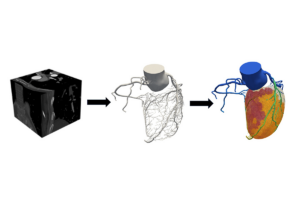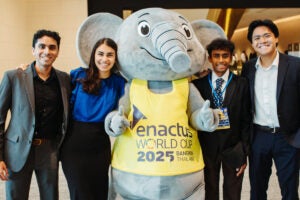In 2017, Andy Uhler was working as a sustainability reporter for the public radio show “Marketplace” in Los Angeles and had been on assignment in Midland when he asked a few interview subjects how they felt about oil and gas contributing to climate change. “There’s such an implication that they are the bad guy, but it’s their job,” he remembers. “That’s the way they make a living. So, we’re kind of calling them out for just doing the work that they do.” At this point, he started sensing something was off, something missing, in the public discourse about energy and the environment.
“I was trying to figure out how to be empathetic while at the same time asking the right questions and asking the questions that need to be asked.”
Uhler put together a one-page pitch for his editors at “Marketplace.” He made the case that they needed someone in Texas covering the energy industry. “For an energy reporter, if you have a byline that says ‘Texas,’ there’s an inherent legitimacy that comes with it. I said, ‘Look, from Austin I can be in the Permian Basin in five hours and talk to those voices.’ We needed to diversify the voices we were hearing on the radio. It’s what folks criticize the media about all the time — coastal elites.”
He wanted to hear what front-line workers in energy were worried about. “What are we getting wrong? We need to go out to the communities and talk to people about exactly what’s happening. We need to hear their voices. I can call a whole bunch of people at Yale and Princeton, and that’s great, and they do wonderful work and great research. But hearing from the people who are actually going to be affected by the policies, by businesses moving in, by businesses moving out — that was the goal.”

After more than seven years at “Marketplace,” he wanted to try something different, but he has brought that same mission — to tell the human stories of the energy industry in Texas — to his work at UT. For the past year, Uhler has been a journalism fellow at UT’s Energy Institute producing the energy podcast “Phases and Stages” (a Willie Nelson reference befitting the sometimes music journalist).
If you’ve lived in Texas during the past 20 years and have listened to public radio, chances are good you know Uhler’s voice. He started his career at KUT while still a UT English major and went full time at the station when he graduated in 2005. Since then, in addition to “Marketplace,” he has reported for “Texas Music Matters” and “Texas Standard.”
Uhler earned a master’s degree in global policy studies at the LBJ School of Public Affairs in 2014, during which time he interned as a legislative aide for energy and the environment for state Rep. Lyle Larson of San Antonio. As Larson was focused almost exclusively on water allocation during a time of severe drought, it represented Uhler’s first deep dive into sustainability issues.
Of the energy discourse, he says, “The big argument for me was that we weren’t having a conversation. Until you have that, you’re actually not going to be progressing forward — you’re just going to be doing whatever you can to stop the other side from doing what it wants to do.”
The big argument for me was that we weren't having a conversation. Until you have that, you're actually not going to be progressing forward ...
After a while, it became clear that a podcast was the way to go. “Part of the problem is that this stuff is really complicated. If you give me a minute and a half on a radio program to explain carbon capture and storage, I’m not going to get you there. I can give you some glimpses, and I can tell you go check out this paper, but you’re not going to do it. For me, it was about having more space and more time.”
Not only are people tied to the energy industry because of their jobs, many are tied by family history. “There are a lot of folks in Midland I talked to who are sixth-generation mineral rights holders. I said, ‘I need you all to tell us what that’s like. Even if you have some people that are going to disagree with you on oil and gas, you need us to understand that you’re talking about your livelihood and your family history.’”
There are now four episodes of “Phases and Stages.” The average commute in the United States is 22 minutes, so he strategically edits the episodes to between 10 and 20 minutes. “I want to make this listenable to you on your way to work.”
Conscious of the animosities, suspicions and stereotypes on all sides of energy issues, when reporting in the field he only references being from Fort Worth, which is true. “I never say anything about Austin!”
The problem is not that Texas’ big cities are not being heard, he says. “Dallas, Fort Worth, Austin, Houston — their news gets out there.” On the other hand, “You don’t have a whole lot of half-hour or hour programs dedicated to Port Arthur. There are so many cool stories and cool characters.”
One especially revelatory episode was on Rockdale, about an hour’s drive northeast of Austin. “I talked to people who work in the energy industry, and they say they had no idea the largest aluminum smelter in the nation in the 1960s was in Rockdale, Texas. And it was located there because of coal. I knew that there was lignite coal in east-central Texas, but I didn’t know Rockdale was a company town. Everybody worked at Alcoa, or someone in their family did or worked at the coal plant or worked at the power plant.
“I went to this gas station that was also a hangout for a whole bunch of dudes that would just sit and drink coffee on a picnic table every day. I asked them to tell me about Alcoa, and every one of them had some story. They had all worked there or worked at the coal plant. There was a little bit of bitterness from the plant going away and leaving the town. It’s that old familiar tale of company towns,” says Uhler.

He also didn’t realize there was a connection between Rockdale and the siting of Samsung Austin Semiconductor in Taylor, about 15 minutes’ drive from where Alcoa once was. He says not only was Samsung securing energy because of Rockdale’s old power infrastructure such as substations and transmission lines, which is why bitcoin miners are out there too; it has water because the Alcoa plant had built reservoirs for cooling their facility.
He has produced twin episodes on the rival energy towns of Odessa and Midland. The Friday Night Lights rivalry was an effective template for telling the story of the competition playing out in the energy industry. He says in some sense the blue-collar/white collar character of the cities echoes of the same divide to the northeast: Odessa being to Midland as Fort Worth is to Dallas.
Other surprises were learning that the energy capital of the world could have been Beaumont instead of Houston, and that Dean Martin and Frank Sinatra used to play downtown Port Arthur. “It was such a rich town — because petrochemicals and refining had come there — that in the 1950s it was a place to be seen. Now, you go downtown and everything is for lease or for sale. I pushed the community on this a lot and asked, how much responsibility does this big industry have that’s taking these resources from you? More often than not, the conversation ends up being, ‘Well, they try. They give us money for a really cool Christmas parade.’”
Getting companies to invest more heavily in the schools and roads of communities where they operate would go a long way toward preventing once-thriving cities from becoming forgotten pockets of poverty, he says. “I keep coming at this with: industry needs to give back more to these towns, and I think industry, to its credit, points me to things that they’ve done. It still feels like they could do more.”
Uhler has planned out three seasons of 10 episodes each. Season 1 is something of a travelog, in which he’s collecting stories from different regions of the state. Texas is so big that he says he could have done all 10 episodes of the first season in Southeast Texas. “But there are huge wind farms outside of Amarillo, and those people up in the Panhandle are not hearing their voices on the radio or on podcasts. That needs to change.”
Industry needs to give back more to these towns, and I think industry, to its credit, points me to things that they've done. It still feels like they could do more.
Season 2 will profile energy innovators, such as entrepreneurs building direct-air carbon capture. Season 3 will be about international implications for the technology and people in the Texas energy industry. How might natural gas from Southeast Texas get converted to hydrogen and sent to Japan? Or will it be sent directly to Europe to help wean them off Russian oil and gas? While in Japan this year, he interviewed several energy executives looking at Houston and its HyVelocity Hub as a potential hydrogen source for Asia.
“Season 3 is very much leaning into ‘What starts here changes the world,’ Uhler says, “because it’s about things that have international appeal and technology that started here or resources that are here.” Although he’s currently a one-man band, he says he would love to build a small team to speed up podcast production.
On getting to know his subjects, Uhler says, “Driving around with a dude in a pickup for two hours and talking about being an independent oil and gas producer — it’s fun, but I’ll also talk to him about the Dallas Cowboys and the Texas Rangers. I think that’s a really important part of this too. These are people, you know?”

![Rig 1[33].jpg](https://news.utexas.edu/wp-content/uploads/2025/07/Rig-133.jpg.jpeg)


